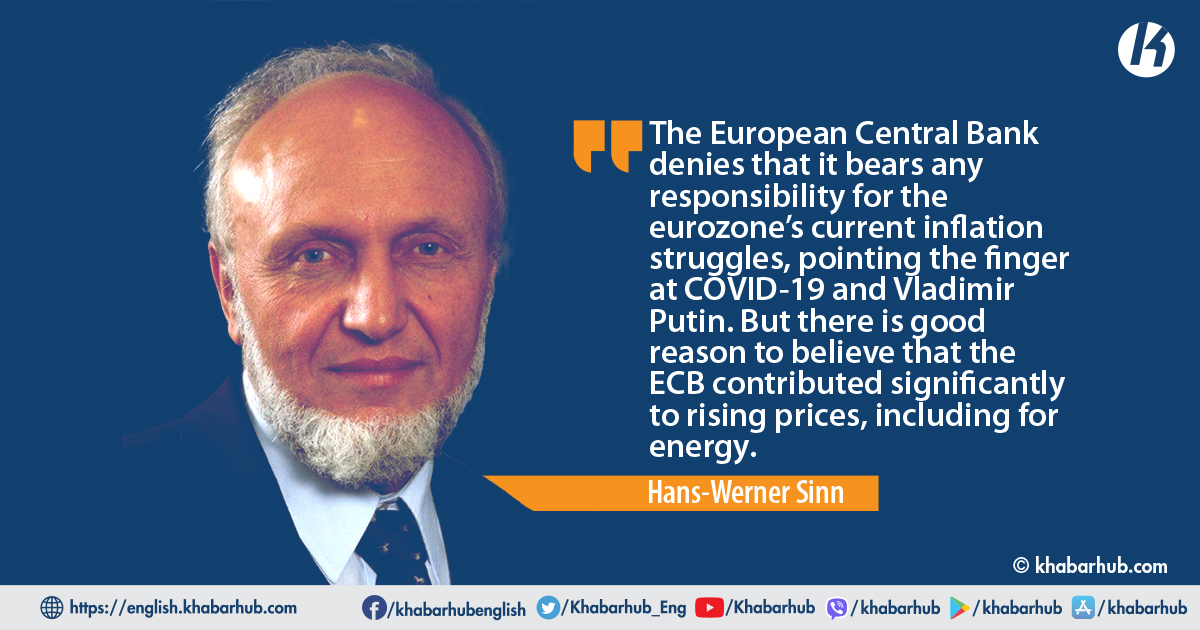Inflation is galloping in the eurozone, as the euro tumbles. In August 2022 annual eurozone inflation reached 9.1%, and rates exceeding 20% are now being registered in the Baltic countries.
In May 2021, a euro would have cost you more than $1.20; on September 27, you could buy one for $0.96. Is the European Central Bank to blame?
Loss of confidence in the euro jeopardizes the monetary union’s stability, because it can fuel an inflationary spiral and lead to capital flight. The United Kingdom is currently grappling with these dynamics, and the eurozone could well be next.
Recent inflation news from the eurozone’s largest member, Germany, is particularly alarming. In August, producer prices – which measure what is happening at the preliminary stages of industrial production – were a whopping 46% higher than in the same month last year.
Given the long-term correlation between the growth rate of producer and consumer prices, this suggests that the latter could soar to 14% in November. Price stability – which is supposed to be the ECB’s uncompromising goal, per the Maastricht Treaty – is no longer perceptible.
Although the prices of goods and services that are not traded internationally were not immediately affected, it is only a matter of time before they will follow suit.
The ECB denies that it bears any responsibility for the eurozone’s current inflation struggles; after all, it could not control the pandemic or Russian President Vladimir Putin’s decision to invade Ukraine.
But pointing to these exogenous events is nothing more than a diversionary tactic. In fact, there is good reason to believe that the ECB contributed significantly to current inflation, probably even more than other central banks have done in their respective economies.
Since the 2008 global economic crisis, the ECB has allowed the central-bank money supply to increase twice as fast, relative to economic output, as the US Federal Reserve has. Of that growth, 83% was the result of the ECB’s purchases of government bonds from eurozone countries. With those purchases – which totaled an estimated €4.4 trillion – the ECB pushed interest rates on government bonds to around zero. This spurred countries to disregard European debt rules and accumulate debt at a breakneck pace.1
In 2020, the European Commission joined the ECB in its expansionary endeavor. The European Union’s €750 billion in additional borrowing was presented as an effort to help all EU countries cope with the effects of the COVID-19 pandemic; in reality, it was intended primarily to support the weaker economies of the Mediterranean region.
As a result of these measures, the EU’s overall government debt (including debt held at the EU level) will be pushed well beyond 100% of GDP.
Since government debt increases aggregate demand, this has had a clear impact on inflation. While pandemic-related supply-chain bottlenecks and the energy crisis induced by the Ukraine war were the sparks, sovereign debt was the tinder. Without it, the inflation fire would not have spread at such a rapid pace.
The ECB has further contributed to inflationary pressures by weakening the euro.
While the Fed began sending clear signals in June 2021 that it would begin raising interest rates in the foreseeable future, the ECB aggressively defended its ultra-loose monetary policy until July 2022, when it implemented its first rate hike in 11 years, which was followed by a somewhat more substantial hike in September.
As a result, the interest-rate differential between the US and the eurozone continued to grow, spurring investors to flee Europe for America in droves.
In the three weeks after the rate increase in September, the dollar rose 4% above parity with the euro. Since the Fed’s first announcement in June 2021 that it might raise rates, the dollar has appreciated by roughly 20% against the euro.
As the euro weakened, prices for imported goods and services rose, and European exporters were able to raise prices without losing market share.
But it has yet to own up to the fact that it bears significant responsibility for even this component, owing to its role in driving the euro’s depreciation.
Although the prices of goods and services that are not traded internationally were not immediately affected, it is only a matter of time before they will follow suit.
Meanwhile, energy prices, in particular, are soaring. The revaluation of the dollar alone increased oil prices expressed in euros by 25%, in addition to the increase in the dollar price resulting from supply shortages.
Even the prices of natural gas were affected by the revaluation, which represents a notable shift from the past, when European gas prices were set largely independently of global markets.
The difference now is that, as Putin has turned off Europe’s tap, liquefied natural gas traded on world markets has become the marginal source of supply, capping the price hike in terms of euros at a level that is higher the more the euro depreciates.
The ECB has tried to exculpate itself by pointing out that the increase in energy prices accounts for a good third of European inflation.
But it has yet to own up to the fact that it bears significant responsibility for even this component, owing to its role in driving the euro’s depreciation.
When it comes to eurozone inflation – including energy prices – the ECB shares the blame with Putin and OPEC.
(Hans-Werner Sinn, Professor Emeritus of Economics at the University of Munich, is a former president of the Ifo Institute for Economic Research and serves on the German economy ministry’s Advisory Council)
Copyright: Project Syndicate








Comment